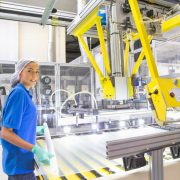Suicide in the construction industry – the silent mental health crisis
In an industry with rigorous safety regulations, it is startling to discover the existence of a mental health crisis in the construction sector that is upsetting in its severity. Australian construction workers are six times more likely to die from suicide than an accident at work1. Every year 190 construction workers take their own lives, which distressingly equates to a construction worker committing suicide every second day.
Alarmingly younger workers in the construction industry between the age of 15 to 24 years old were found to have even higher risk of suicide compared to the suicide rate of average Australian males2. It was found that young construction workers are two times more likely to take their own lives compared to average young Australian men.

The silent and unacknowledged issue
These upsetting statistics highlight the urgency and seriousness of the suicide crisis in the construction and building industry. However this issue often goes unaddressed and even unacknowledged by many in the industry, with research showing that workers find it difficult to share their mental health issues with their colleagues at work1,5. Unhelpful conceptions of masculinity are encouraged within the industry, including restricted emotionality, high amounts of stigma against discussing feelings and emotions, and a common view that male workers who have a problem are not ‘manly’. Often mental health issues are not shared between colleagues, with those suffering from poor mental health keeping the problem to themselves.
Work related factors contributing to suicide
The construction industry is highly competitive, with most work allocated through open tendering and contracts. Due to high capital investments, companies bidding for tenders face high pressures to ensure projects are delivered on time and on budget, which subsequently places high demands on the workers.

Various researchers have identified the following work related factors contributing to construction worker suicides:
- Long hours and demands to complete projects under a short time frame3,4
Workers commonly work six days a week – up to 80 hours each week – which impacts on time spent with family at home, participation in recreational activities and overall quality of life.
- Working in high risk environment
Working in a high risk environment adds further mental stresses and strains on the worker.
- Majority of workers are male
In 2020 the Australia Bureau of Statistics recorded that in Australia 87.6% of construction workers were men. Research have found that men are at a greater risk of suicide than women (World Health Organisation, 2014).
- Majority of construction workers are highly transient1,5
Work within the industry is highly transient with most workers employed on a project-by-project basis, for periods ranging from a few weeks to at best a few years. Workers may then find it difficult to create and form support networks within their workplace. A highly casualised workforce, coupled with high job insecurity were identified as a risk factor for mental ill-health in the construction industry5.
- Majority of workers are employed by smaller firms3
Employers within the construction and building industry are typically small , usually employing fewer than 100 employees. These employers almost exclusively subcontract to larger project management companies and many lack sophisticated human resource capability to support mental health among their workers.
- Bullying in the workplace is more prevalent in blue-collar working environments3,4
Studies among focus groups have found that high rates of suicide among younger workers could be related to the pressures associated with joining a ‘masculine’ industry that has a bullying culture directed towards apprentices and those new to the industry. Workplace bullying in the construction industry can take the form of intimidation and isolation, as well as unrealistic deadlines, excessive work hours and non-existent lunch breaks.
- A culture of heavy drinking as well as past and current drug use3,4
It was found that alcohol and substance misuse were prevalent among construction workers and was described as a self-medicating mechanism for dealing with the pressures of the industry. Alcohol use was identified as a factor preceding suicide from psychological autopsy data reported by researchers from the Australian Institute of Suicide Research and Prevention (AISRAP)4.

Construction workers face enormous pressures to work long hours and complete projects as fast as possible, often in high risk environments
Interpersonal and family factors
Researchers from AISRAP4 also found that long working hours was an indirect influence on increasing suicide risks. Long hours were found to significantly impact on mental health, with work-related stress affecting workers’ moods at home and contributing to problems at home. It was found that those among the Queensland construction industry who took their own lives were more likely to be separated/ divorced and have serious relationship problems preceding their death3.

Employer obligations to manage worker mental health
Whilst not all mental issues are caused from work, SafeWork NSW states that employers have a responsibility under work health and safety laws to ensure workplace psycho-social hazards that may lead to mental ill-health are effectively addressed, managed and controlled2.

Employers and supervisors do not have to be an expert to talk with their workers on mental health issues. It is important to create a culture where discussion and consultation of worker mental health and well-being is a normalised part of work, and is given the same importance as physical safety management.
Research5 has shown that social support from work colleagues is particularly important among those experiencing poor mental health. Therefore the value of ‘mateshipness’ and male bonds within the industry should be targeted as strong tools in suicide prevention initiatives.

Employers should familiarise themselves with all possible psycho-social hazards, which are often unique to the construction industry, and ensure safe systems of work are in place to manage and control hazards. Refer to the SafeWork NSW Code of Practice for Managing Psycho-social Hazards at Work (2021) for more information on employer responsibilities as well as how to identify and manage mental health risks at work.
Mental Health First Aiders
Just like normal First Aiders in the workplace, employers should strongly consider appointing key workers to be Mental Health First Aiders in their workplace.

Mental Health First Aiders are equipped with the skills and confidence to initiate conversations around mental health with their colleagues
The benefits of having trained Mental Health First Aiders in your workplace include:
- Ensuring there are key workers who are trained in early intervention courses that teaches the practical skills needed to support someone experiencing a mental health problem
- Raising awareness about mental health in your organisation
- Ensuring someone is qualified to recognise signs of poor mental health among your workers
- Promoting healthy management and coping strategies for dealing with psychosocial hazards
Seeking Help
If you are struggling with mental health issues, do not try to quietly deal with the issues yourself whilst saying to others “I’m Ok”.
When in difficulties is it useful to talk to someone else about them. Use the resources around you that are available, in your workplace, among colleagues, family or friends, or via external organisations such as:
- Mates in Construction – mates.org.au
- Lifeline – 13 11 14 or lifeline.org.au – Call 24/7 for crisis support and suicide prevention services. Text support is also available on 0477 13 11 14
- Beyond Blue – 1300 22 4636 or beyondblue.org.au – Call 24/7 for advice, referral and support from a trained mental health professional
- MensLine Australia – 1300 78 99 78 0r mensline.org.au – Call 24/7 for telephone and online support for men with emotional health and relationship concerns
- Suicide Call Back Service – 1300 659 467 or suicidecallbackservice.org.au – Call 24/7 for free counselling and support for people at risk or suicide, carers and bereaved
Seeking professional help early can reduce the impact of poor mental health. It can mean the difference between exhausting yourself trying to manage issues alone or being helped to find ways of dealing with issues and hopefully getting better in the long run.

Further Resources
A. SafeWork NSW, “Code of Practice – Managing Psychosocial Hazards at Work”, NSW Government, May 2021.
B. SafeWork NSW, “Mental Health in Construction – Fact Sheet”, www.safeworknsw.gov.au, accessed on 21 March 2022.
C. SafeWork NSW, “Mentally Healthy Workplaces in Construction – Toolbox Talk Fact Sheet”, www.safeworknsw.gov.au, accessed 21 March 2022.
Citations
- Mates in Construction, 2022, “Why Mates Exists: The Problem – Sobering Facts”, www.mates.org.au, accessed on 21 March 2022.
- Maheen, H., LaMontagne, A., King, T., “ Suicide in the Construction Industry: 2001 – 2018”, Report submitted to Mates in Construction by the University of Melbourne, Vol 4, 2021.
- Shannon, Greg, “Mates Helping Mates: A History of Mates in Construction, Queensland (2008-2018)”, Mates in Construction Australia, 2018.
- Australian Institute for Suicide Research and Prevention (AISRAP), Griffith University, www.griffith.edu.au, accessed on 21 March 2022.
- Milner, A., Maheen, H., Currier, D., LaMontagne, A., “Male Suicide Among Construction Workers in Australia: A Qualitative Analysis of the Major Stressors Precipitating Death”, BMC Public Health, June 2017, www.bmcpublichealth.biomedcentral.com, accessed on 22 March 2022.











